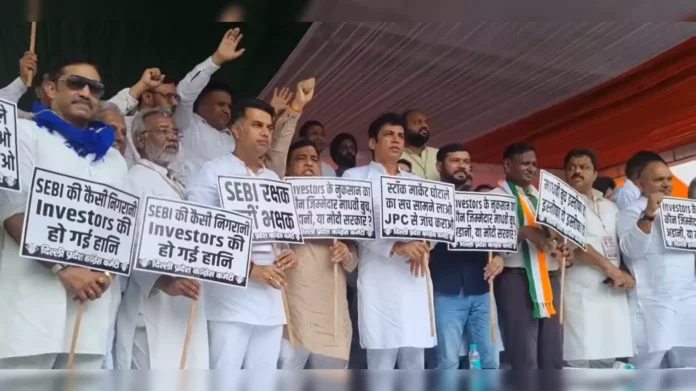The Assam Congress has escalated its efforts to address what it perceives as serious concerns surrounding the Adani Group by demanding the resignation of the Securities and Exchange Board of India (SEBI) Chief. The party has also called for a Joint Parliamentary Committee (JPC) probe to investigate the allegations against the conglomerate, focusing on issues related to financial transparency and regulatory oversight.
Background of the Adani Controversy
The Adani Group, one of India’s largest conglomerates, has been under scrutiny following allegations of stock manipulation, financial misreporting, and other regulatory lapses. These allegations have led to widespread concerns about the role of regulatory bodies like SEBI in overseeing such large-scale operations and ensuring adherence to financial norms.
The Assam Congress, along with other opposition parties, has voiced its apprehensions about the alleged irregularities and the possible implications for India’s financial markets. They argue that the integrity of the country’s financial regulatory framework is at stake and that a thorough investigation is necessary to maintain public trust.
Assam Congress’s Demand for SEBI Chief’s Resignation
In a recent statement, the Assam Congress accused the SEBI Chief of failing to uphold the regulatory body’s responsibilities, particularly in relation to the oversight of the Adani Group’s activities. The party alleges that SEBI’s inaction or delayed response to the allegations has eroded confidence in the regulatory system.
The Assam Congress leaders have demanded that the SEBI Chief step down immediately to allow for an impartial investigation into the matter. They believe that the current leadership’s continued presence could hinder the transparency and effectiveness of any forthcoming investigations.
Call for a Joint Parliamentary Committee (JPC) Probe
In addition to demanding the resignation of the SEBI Chief, the Assam Congress has called for the formation of a Joint Parliamentary Committee (JPC) to probe the Adani issue. The JPC, composed of members from both houses of Parliament, would have the authority to investigate the allegations in detail and summon witnesses, including corporate executives and regulators.
The party argues that a JPC probe is essential to uncover the truth and ensure that all relevant aspects of the controversy are thoroughly examined. They assert that only a parliamentary inquiry can provide the level of transparency and accountability necessary to address the public’s concerns.
Implications of the Demand
The demand for the SEBI Chief’s resignation and the call for a JPC probe have significant political and financial implications. If the demands are met, it could lead to major shifts in India’s regulatory landscape, potentially affecting the operations of other large conglomerates as well.
Moreover, a JPC probe could bring to light new information that might impact the Adani Group’s business operations and market standing. The controversy has already led to fluctuations in the stock market, and further developments could exacerbate these effects.
The Adani Group’s Response
The Adani Group has consistently denied the allegations against it, maintaining that its operations are transparent and in full compliance with all regulatory requirements. The conglomerate has also expressed confidence in SEBI and other regulatory bodies, asserting that any inquiries will clear its name.
However, the Assam Congress and other critics remain unconvinced, arguing that the sheer scale of the allegations warrants an independent and comprehensive investigation.
The Assam Congress is becoming increasingly concerned about regulatory monitoring in India’s financial sector, as seen by its demands for the resignation of the SEBI chief and a JPC investigation into the Adani issue. The Adani Group and the larger business community will be greatly impacted by the central government’s and regulatory authorities’ response, which will be closely monitored as the crisis progresses.
In the meantime, the call for greater transparency and accountability continues to resonate, reflecting the public’s demand for a robust and trustworthy financial regulatory system.




